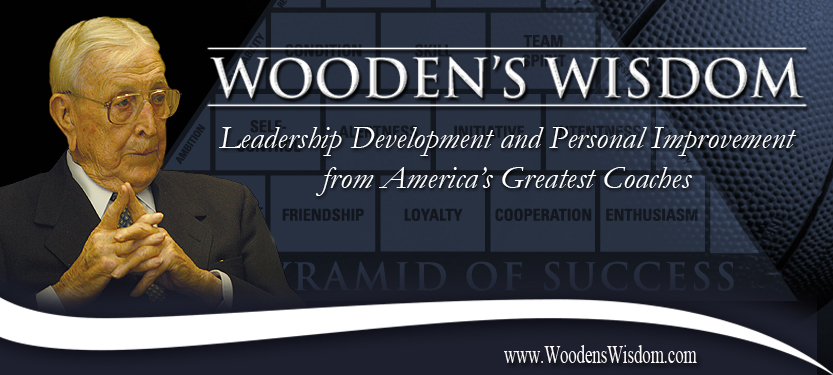 |
|
| Wooden's Wisdom - Volume 8 | Issue 352 |
| Craig Impelman Speaking | Championship Coaches | Champion's Leadership Library Login | |
|
ENTHUSIASM AND TEAM SPIRIT (WARD “PIGGY” LAMBERT - PART SIX) John Wooden's college coach at Purdue was Hall of Famer and Basketball Coaching Pioneer Ward "Piggy" Lambert. Coach Lambert wrote Practical Basketball in 1932, one of the first "bibles" of the game (a 243 page textbook). In his book Coach Lambert asserted that it is the responsibility of the Coach to create an environment where Enthusiasm and Team Spirit can flourish. He put it this way:
"Enthusiasm and Team Spirit must be developed by the coach in practice. Half-hearted players are a detriment to the squad. The best player who lacks enthusiasm cannot do his best. The coach must be aggressive in practice and stimulate enthusiasm by encouragement. There is no human who does not like credit for good work, and the coach who continually tells his players they are "rotten" is sure to make them so. He has to develop pride in co-operation and team play, and create the desire to win. The attitude of mind in preparation for the coming game should be built up during the preceding week of practice. The process should be gradual in order to key the players' minds. This is preferable to the inspirational oration the night of the game. Send the players on the floor aggressive mentally on offense-not in fear of the offensive strength of the opponents. Give them confidence and enthusiasm."
In his book with Don Yeager: A Game Plan for Life: The Power of Mentoring, Coach Wooden described how Coach Lambert communicated effectively while maintaining Enthusiasm and Team Spirit:
"Coach Lambert showed me the importance of tailoring one's coaching style to each individual athlete. There were some players who responded better to short, frank instructions ("Stop flicking your wrist to peck the ball at the net!") and others who responded to a gentler tone ("Next time, I want you to try to roll the ball off your fingertips and see if that doesn't help you make the shot better."). Because he had taken the time to really get to know us, he understood what manner of correction would yield the best results from each player."
Because he was an educator and not an antagonizer, Coach Lambert became a role model Coach Wooden studied closely. In A Game Plan for Life, Coach Wooden described it this way:
"I started watching Coach Lambert in a different way, trying not only to learn from him as a player, but also to study how he coached and what made him effective as the leader of a team. I was making a note of the traits that seemed to be the most important, and the most universal, in successful individuals. Conditioning, skill, quickness, execution, and team play were philosophies I learned from watching Coach Lambert interact with us."
Youngsters often interact with others the way their parents do. Coaches often coach the way they were coached. Managers often manage the way they were managed. Coach Lambert set a great example for John Wooden.
What type of example are you setting?
Yours in Coaching, Craig Impelman
|
Improvement (Part One) The joy of life is living it, or so it seems to me; Edgar Allen Guest (1881-1959)
|
|
For more information visit www.woodenswisdom.com |
|
© Copyright 2026 WoodensWisdom.com | # of Times Wooden's Wisdom Issues Opened: 7,826,061
Hosting & Design by:EverydayWebDesign.com